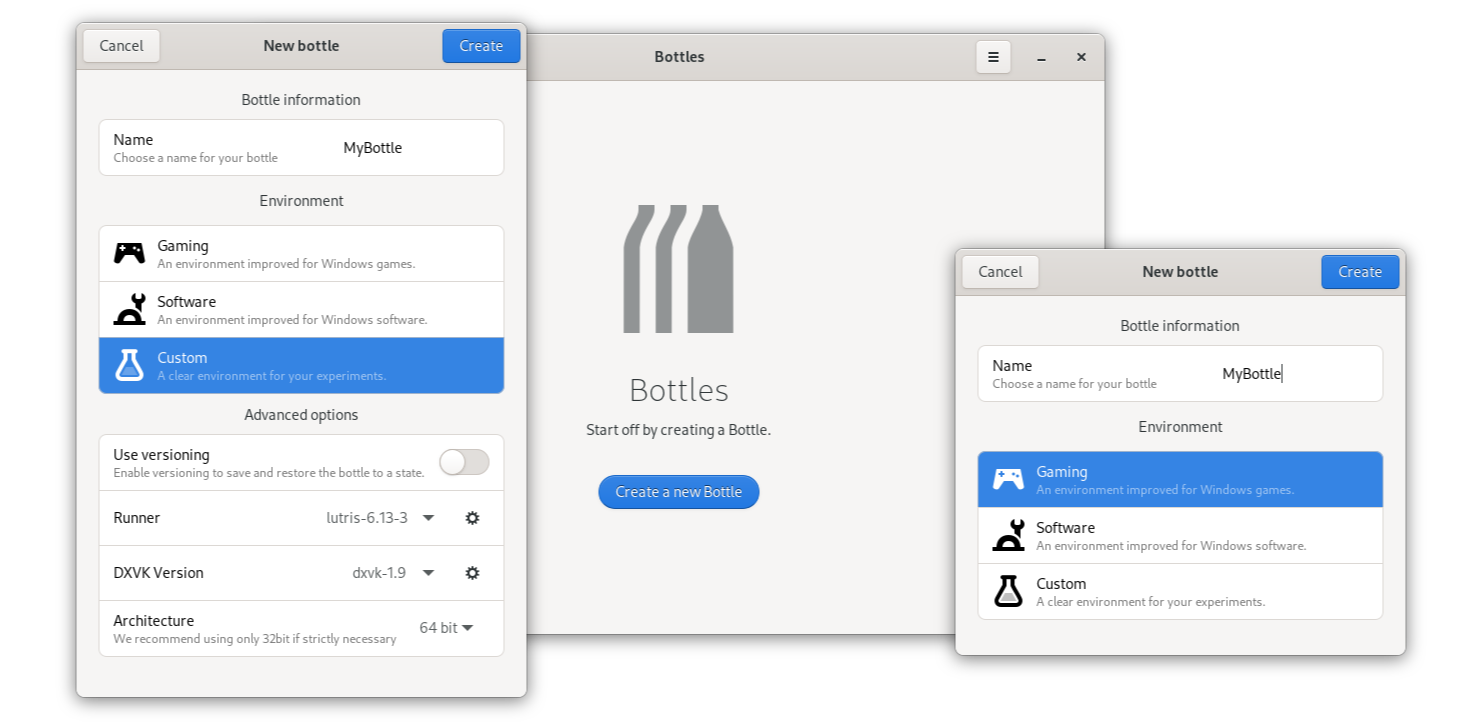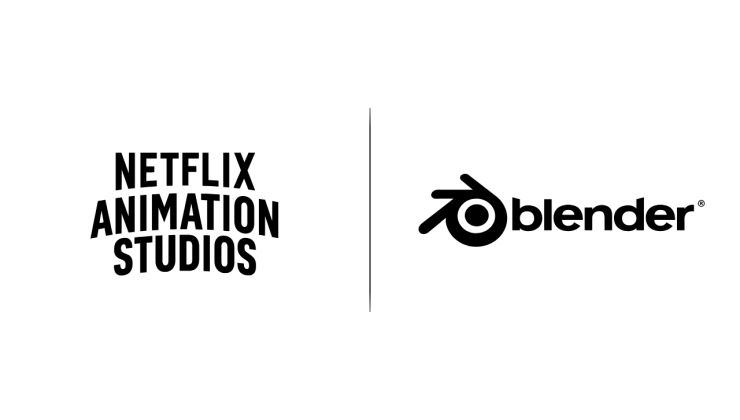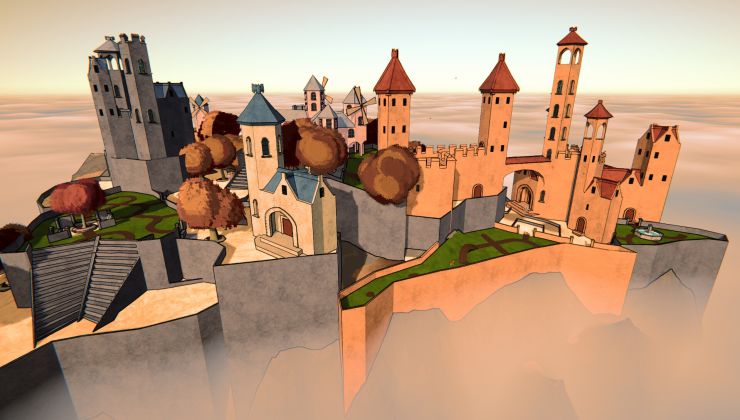Bottles isn't exactly a new Linux application but it's one I had only heard about recently. It's been advancing a lot in the last year and it's really looking great. Unlike other manager applications including Lutris, GameHub and so on it has a singular purpose — Bottles is designed to give you the best possible experience when managing the Windows compatibility layer Wine.
It includes a lot of options to allow you to easily tweak your installs with a few clicks of a button, which is exactly what I love about it. There's a few "runners" included which are various versions of Wine like their own Vaniglia, that has a few wine-staging patches and a newer updated theme and Lutris' Wine.
Everything is run inside Bottles, contained areas that keeps all your installs separated. A form of sandboxing from the rest of your system, and if you go with the Flatpak package you get this in full. A benefit of all this, is that each Bottle can have multiple restore points. So if you messed with it and it broke your Windows game, you can send it back to a previous point when it worked.
Much like the Winetricks app, Bottles also includes its own dependency manager allowing you to install extras into your environments. Some games and applications will only work with these extras, so to see it all included together - again with only a few button clicks is wonderful.
Bottles might have one of the smoothest and best looking ways to install and manage games / applications with Wine on Linux. Give it a try.
Quoting: GuppyMaybe just my mind playing tricks on me, but didn't wine prefixes used to be called bottles?As for Wine itself "prefix" was more popular. As fro CrossOver they indeed called it bottles.
But let's assume Desktop will prevail and Linux have a chance to dominate over windows. Then Linux need to improve in these topics:
- GUI. It needs GUI for everything and I mean EVERYTHING!. (like this software solves a problem that wine itself don't). There are no users interested in using the terminal in the mainstream.
- The system cannot allow the user to break it easily (Linus effect)
- Latency and Inputlag must be ridiculously low and Desktop Environ and the kernel needs to handle that by default.
- BT needs to be rewriten... seriously...
- It needs Adobe (don't think will happen in the nier future)
- It needs Games (on going by now)
- It needs HDR and above 8 bit collors...
- It needs to keep backward compatibylity! Linux cannot break software because you update a lib that dropped legacy support.
Also, none of that needs to offer a windows like experience. Making a system easy and simple is very hard but also very necessary!
Lutris has better community support and installers that do special things like install GoG games with mods already applied, but the UI is like it was made by an army of drunk squirrels. It serves a different purpose than Bottles though, as the article says.
Anyway, +1 for managing wine with Bottles.
pirating games on linux is harder, some times you have to do a bunch of steps on windows to crack an game, and the tutorials simply dont translate well to an linux enviroment.
i mean, i remember when i was trying to instal palib on linux, i dont remember if it had an linux version that i couldnt install or what, but installing on windows was already hard enough (you had to setup an enviroment variable, first time that i saw this term on an windows context), now imagine if i tried to install the windows version on linux back then...
google it "how to setup an windows variable on windows on linux"
or better "how to setup an windows enviroment variable on wine"
its an issue to specific and google might return 0 results, or tons of results for windows but only a few for linux if you dig deep enough, or maybe no one has ever tried.
now multiply that for every game you try to pirate.
regardless of what you think about piracy, this is an major issue that we have to solve if we want linux to become popular, most gamers dont purchase everything, many test drive the pirated version to know if its worth purchasing.
Minor points where Bottles differs are:
- Bottles/Prefixes are always created in ~/.local/share/bottles. Symlinking can solve that if you want and you can change the location afterwards from the GUI.
- Bottles doesn't use Winetricks but its own code. Not a pro or con, just something worth mentioning.
- Bottles uses its own builds of Wine (runners). This makes setup much easier, but less flexible if you prefer your own builds or want to configure an existing prefix.
- Bottles can import other prefixes, but it won't use the config of them (the wrapper.cfg format that winetricks, Vineyard, q4wine and wibom settled on almost a decade ago)
- Bottles has support for DXVK, FSR, DLSS, Esync/Fsync and other newer Wine technologies whereas Vineyard is stuck in the past :)
I think Bottles is a great project and this list isn't meant to "call out" the project on anything, just a little note for anyone that happened to have used Vineyard and was wondering what the major differences are since the projects are very similar at a first quick glance.
Note: I'm the author of Vineyard.
Last edited by Cybolic on 14 Dec 2021 at 1:27 pm UTC
Quoting: tamodolo- The system cannot allow the user to break it easily (Linus effect)Well, then Windows is off the table.
Quoting: elmapulthat remind me of a thing...
pirating games on linux is harder, some times you have to do a bunch of steps on windows to crack an game, and the tutorials simply dont translate well to an linux enviroment.
i mean, i remember when i was trying to instal palib on linux, i dont remember if it had an linux version that i couldnt install or what, but installing on windows was already hard enough (you had to setup an enviroment variable, first time that i saw this term on an windows context), now imagine if i tried to install the windows version on linux back then...
google it "how to setup an windows variable on windows on linux"
or better "how to setup an windows enviroment variable on wine"
its an issue to specific and google might return 0 results, or tons of results for windows but only a few for linux if you dig deep enough, or maybe no one has ever tried.
now multiply that for every game you try to pirate.
regardless of what you think about piracy, this is an major issue that we have to solve if we want linux to become popular, most gamers dont purchase everything, many test drive the pirated version to know if its worth purchasing.
Quoting: tamodoloSome recent post said that Linux needs to be pre-installed more to hit mainstream. This is somewhat naive to say specialy if you think Linux have high quality distributions for desktop use today. Unfortunately the desktop is almost dead. The new generation don't use computers but cellphone instead of it.
But let's assume Desktop will prevail and Linux have a chance to dominate over windows. Then Linux need to improve in these topics:
- GUI. It needs GUI for everything and I mean EVERYTHING!. (like this software solves a problem that wine itself don't). There are no users interested in using the terminal in the mainstream.
- The system cannot allow the user to break it easily (Linus effect)
- Latency and Inputlag must be ridiculously low and Desktop Environ and the kernel needs to handle that by default.
- BT needs to be rewriten... seriously...
- It needs Adobe (don't think will happen in the nier future)
- It needs Games (on going by now)
- It needs HDR and above 8 bit collors...
- It needs to keep backward compatibylity! Linux cannot break software because you update a lib that dropped legacy support.
Also, none of that needs to offer a windows like experience. Making a system easy and simple is very hard but also very necessary!
- GUI. It needs GUI for everything and I mean EVERYTHING!. (like this software solves a problem that wine itself don't). There are no users interested in using the terminal in the mainstream.There should not be a GUI for everything. Even on Windows and Mac OS some things are only possible on the command line...
- It needs Adobe (don't think will happen in the nier future)The last thing Linux should do is copy other operating systems. Linux is great because of how unique it is.
- It needs HDR and above 8 bit collors...I do agree that it does lack in some technical areas and that should be fixed.
- It needs to keep backward compatibylity! Linux cannot break software because you update a lib that dropped legacy support.Windows keeps everything and Mac OS moves on all quickly from legacy code and Linux is somewhere in between. In my experience, I think that Mac OS does this the right way.
- The system cannot allow the user to break it easily (Linus effect)For every system I've used this can be done just in different ways. When I first started learning Windows I broke the whole system several times and same with Linux and Mac OS.
I do agree that apt should never have allowed a user the choice in the first place and rm -f was disallowed for the same reason.
Operating Systems are very complex and users will figure out a way to break them no matter how much effort you put into that.
Quoting: EhvisI may have to look into this. But its success is largely dependent on having a bunch of useful pre-built wine versions available for easy install. This is what is most appealing about Lutris, with the added benefit of having the community install scripts available.This is mentioned in the article, but you can install an assortment of its own "vaniglia" builds, Glorious Eggroll, tkg, lutris, lutris-ge.
Last edited by rustybroomhandle on 14 Dec 2021 at 2:59 pm UTC
Quoting: elmapuli mean, i remember when i was trying to instal palib on linux, i dont remember if it had an linux version that i couldnt install or what, but installing on windows was already hard enough (you had to setup an enviroment variable, first time that i saw this term on an windows context), now imagine if i tried to install the windows version on linux back then...First result for "Wine environment variables"
google it "how to setup an windows variable on windows on linux"
or better "how to setup an windows enviroment variable on wine"
its an issue to specific and google might return 0 results, or tons of results for windows but only a few for linux if you dig deep enough, or maybe no one has ever tried.
now multiply that for every game you try to pirate.
regardless of what you think about piracy, this is an major issue that we have to solve if we want linux to become popular, most gamers dont purchase everything, many test drive the pirated version to know if its worth purchasing.
https://wiki.winehq.org/Wine_User%27s_Guide#Setting_Windows.2FDOS_environment_variables
Either way, as most cracks requires replacing an exe or dll file, as long as the user can figure out where is located the wine prefix the steps for Windows should be the same for Linux.
And worth to mention: using a crack used to be the only way to play some legally owned games on Linux in the past.
Last edited by x_wing on 14 Dec 2021 at 4:45 pm UTC
Quoting: tamodoloUnfortunately the desktop is almost dead. The new generation don't use computers but cellphone instead of it.The desktop is dead for consumers. For everybody else, i.e. for the people that need to use a computer for business/student/workstation/etc purposes, the desktop is actually very, very far from dead. And let's not forget that even the so-called "consumers" are usually only consumers for only some of their computing activity, not all of it. E.g. in my case I may be a consumer using a smartphone for my social needs, or for reading books, or for watching stuff on YouTube, but most of my day is spent on a normal PC.
Quoting: elmapulmany test drive the pirated version to know if its worth purchasing."Standard disclaimer to avoid being branded a pirate" detected :P
Quoting: KohlyKohlWindows keeps everything and Mac OS moves on all quickly from legacy code and Linux is somewhere in between. In my experience, I think that Mac OS does this the right way.I respectfully disagree. The Mac philosophy is good for Macs and smartphones, i.e. for consumer devices. Linux is better than that, and it should strive to replace Windows on the workstation, since that's where the desktop is still thriving, and for that you need backwards compatibility. That's the reason Windows is still so prevalent after all (besides momentum). That, and gaming (the other major use case for the modern desktop), but Valve are already taking care of that one for us.
Last edited by Nocifer on 14 Dec 2021 at 4:56 pm UTC
Quoting: tamodoloSome recent post said that Linux needs to be pre-installed more to hit mainstream. This is somewhat naive to say specialy if you think Linux have high quality distributions for desktop use today. Unfortunately the desktop is almost dead. The new generation don't use computers but cellphone instead of it.The rumours of the desktop's death are a great exaggeration. What happened is that people with no real use for a desktop gradually stopped having one, using a phone instead. But it turns out there are quite a lot of people who do have a real use for a desktop because there are a ton of things you can't do well on a phone, and they still get them, whatever generation they belong to. So we're not looking at a continuous trend towards zero, we're looking at a change in the niche size from near ubiquitous down to just quite common.
Quoting: NociferThe desktop is dead for consumers.Not even that. Plenty of consumers have things they want to do that either require or at least are much better with a desktop. People who like to mess around with photos or video. My ten year old granddaughter has her own youtube channel. People who have any one of a hundred hobbies--my dad does genealogy stuff, some people translate manga and have to clear out the speech bubbles and stick new English words in them. (Looks up at the name of this website) Gamers--how many people are on Steam again? People who write . . . original fiction, fanfics, editing Wikipedia, whatever. People who maintain the website for their church, or do the finances for the tiny charity they help out. Masses and masses of perfectly ordinary consumers have stuff they want to do which requires more than the web and apps on a tiny screen without a real keyboard.
Last edited by Purple Library Guy on 14 Dec 2021 at 6:08 pm UTC
Quoting: KohlyKohlTechnically, that response isn't even wrong. Adobe software /= operating system.- It needs Adobe (don't think will happen in the nier future)The last thing Linux should do is copy other operating systems. Linux is great because of how unique it is.
Substantively, that response is very wrong. Linux is great for many reasons. Failing to run important software is not one of them. This is not a point of "uniqueness". I dislike Adobe as a company. But for many tasks, one or another of their pieces of software is essential to get the job done; they have functional monopoly on certain things, not because of mind share (although that's certainly there) but because there is nothing else that gets the job done. There is no alternative, for instance, to Adobe Acrobat (not the reader, the full deal). I tried, I asked around, there are a couple of minor functions where there's Linux software that can do them, but for the most part, fuggedaboutit.
But we don't really need Adobe to release their software for Linux. Anyway, they never will unless someone dangles the executives over a high precipice by one leg until they agree to do it. What we need is a Proton-like push to get Wine or some derivative to run the top Windows productivity software as simply and transparently on Linux as Proton does with many games. But that stuff has to run on Linux one way or another.
Quoting: x_wingit has been a long time since i tried this enviroment variable thing, so maybe things have changed.Quoting: elmapuli mean, i remember when i was trying to instal palib on linux, i dont remember if it had an linux version that i couldnt install or what, but installing on windows was already hard enough (you had to setup an enviroment variable, first time that i saw this term on an windows context), now imagine if i tried to install the windows version on linux back then...First result for "Wine environment variables"
google it "how to setup an windows variable on windows on linux"
or better "how to setup an windows enviroment variable on wine"
its an issue to specific and google might return 0 results, or tons of results for windows but only a few for linux if you dig deep enough, or maybe no one has ever tried.
now multiply that for every game you try to pirate.
regardless of what you think about piracy, this is an major issue that we have to solve if we want linux to become popular, most gamers dont purchase everything, many test drive the pirated version to know if its worth purchasing.
https://wiki.winehq.org/Wine_User%27s_Guide#Setting_Windows.2FDOS_environment_variables
Either way, as most cracks requires replacing an exe or dll file, as long as the user can figure out where is located the wine prefix the steps for Windows should be the same for Linux.
And worth to mention: using a crack used to be the only way to play some legally owned games on Linux in the past.
anyway it was an random example, but you are right, you have to know where are the dlls, and hope that the cracked game is not an instaler that dont work on wine for some reandom reason, otherwise good luck extracting the content and manually instaling it =p
speaking of it, a few years ago adobe was creating an hiden partition on the HDD to hide their drm checks there, that was causing trouble for people who install linux on dualboot, i wonder if an game do anything like that and if so, how to dodge this =p
Quoting: Purple Library GuyWell, yeah, I kind of said the exact same thing with the rest of my comment. To be frank though, I don't consider these as examples of consumer use, but examples of "business/student/workstation/etc" use. "Consumer use" is just that, consuming stuff created by others, be it watching videos on YouTube, or reading manga on MangaDex, or reading stuff on Wikipedia, or reading the finance chart for your local charity's expenses, or listening to music. These use cases can be perfectly covered by a consumer device such as a smartphone.Quoting: tamodoloSome recent post said that Linux needs to be pre-installed more to hit mainstream. This is somewhat naive to say specialy if you think Linux have high quality distributions for desktop use today. Unfortunately the desktop is almost dead. The new generation don't use computers but cellphone instead of it.The rumours of the desktop's death are a great exaggeration. What happened is that people with no real use for a desktop gradually stopped having one, using a phone instead. But it turns out there are quite a lot of people who do have a real use for a desktop because there are a ton of things you can't do well on a phone, and they still get them, whatever generation they belong to. So we're not looking at a continuous trend towards zero, we're looking at a change in the niche size from near ubiquitous down to just quite common.
Quoting: NociferThe desktop is dead for consumers.Not even that. Plenty of consumers have things they want to do that either require or at least are much better with a desktop. People who like to mess around with photos or video. My ten year old granddaughter has her own youtube channel. People who have any one of a hundred hobbies--my dad does genealogy stuff, some people translate manga and have to clear out the speech bubbles and stick new English words in them. (Looks up at the name of this website) Gamers--how many people are on Steam again? People who write . . . original fiction, fanfics, editing Wikipedia, whatever. People who maintain the website for their church, or do the finances for the tiny charity they help out. Masses and masses of perfectly ordinary consumers have stuff they want to do which requires more than the web and apps on a tiny screen without a real keyboard.
But as soon as you try to do anything else other than consume, i.e. as soon as you start creating videos for YouTube, or scanlating manga on MangaDex, or editing stuff on Wikipedia, or typing out the finance chart for your local charity, or making music, or all the other examples you mentioned and a thousand more like them; then at that point you've transitioned from a consumer of content to a producer of content, and hence a consumer device is no longer enough - you need a desktop, aka a "workstation". And that's where Linux shines, and also where Windows enjoys its biggest market share.
So I stand by my statement: the desktop is dead for consumers, exactly because as you said "people with no real use for a desktop gradually stopped having one, using a phone instead". But for people doing more than consuming, and that's the vast majority of people over the age of ~15 or so (at least in the "first world"), the desktop is still the go-to solution. And that's why I think Linux should absolutely not copy the Mac and smartphone mentality regarding backwards compatibility, because that mentality is consumer mentality, and the desktop is not meant for consumers anymore.
Quoting: Nocifer"Standard disclaimer to avoid being branded a pirate" detected :Pme? i dont care i would proudly hold the label, i dont trust the industry to distibute anime since the 4kids was a thing, and i gonna pirate what is legally avaliable, pirating everything else is the next logical step, but i purchase a lot of things to, either due to lazyness to pirate or to promote what i think worth being supported.
.
Quoting: tamodolo- It needs to keep backward compatibylity! Linux cannot break software because you update a lib that dropped legacy support.This point is seriously a library developers problem, and users should force them to solve this, not Linux. The way Windows solves it (and how "modern Linux distributions" like Flatpak, Snap and AppImage) solves it are just plain awful with bloat and hidden security exploits waiting to happen.
The only lib that I know of that takes this seriously is glibc, they version every function when the ABI/API changes and keep deprecated functions hidden but versioned so that the old applications that linked to them still works. This way an application written for an old glibc still works with a brand new glibc.
Moving this burden over to distro maintainers would increase their workload exponentially, but for the libs devs it would be just to manage backwards compatibility for the one libs they already maintain and in worst case scenarios they could instead of holding on to much old bloat just write a wrapper from the old to the new, e.g SDL should have done this when they moved from SDL1 to SDL2.
Last edited by F.Ultra on 14 Dec 2021 at 7:12 pm UTC
Quoting: elmapulthat remind me of a thing...I never thought I'd hear "pirating software on GNU/Linux is too hard" as a reason not to use the system. I guess I really have heard it all, now.
pirating games on linux is harder, some times you have to do a bunch of steps on windows to crack an game, and the tutorials simply dont translate well to an linux enviroment.
i mean, i remember when i was trying to instal palib on linux, i dont remember if it had an linux version that i couldnt install or what, but installing on windows was already hard enough (you had to setup an enviroment variable, first time that i saw this term on an windows context), now imagine if i tried to install the windows version on linux back then...
google it "how to setup an windows variable on windows on linux"
or better "how to setup an windows enviroment variable on wine"
its an issue to specific and google might return 0 results, or tons of results for windows but only a few for linux if you dig deep enough, or maybe no one has ever tried.
now multiply that for every game you try to pirate.
regardless of what you think about piracy, this is an major issue that we have to solve if we want linux to become popular, most gamers dont purchase everything, many test drive the pirated version to know if its worth purchasing.
Last edited by pleasereadthemanual on 15 Dec 2021 at 3:03 am UTC















 How to setup OpenMW for modern Morrowind on Linux / SteamOS and Steam Deck
How to setup OpenMW for modern Morrowind on Linux / SteamOS and Steam Deck How to install Hollow Knight: Silksong mods on Linux, SteamOS and Steam Deck
How to install Hollow Knight: Silksong mods on Linux, SteamOS and Steam Deck